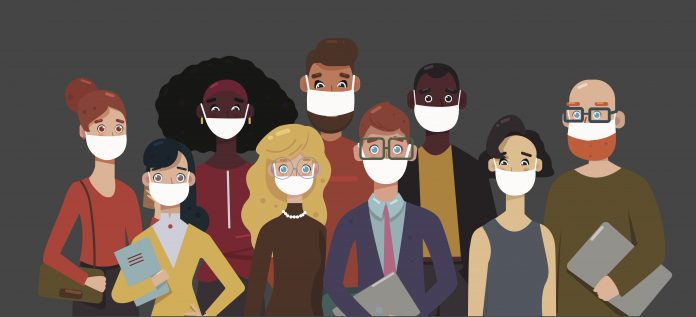A new study shows how masks stopped Melbourne’s second wave, and their effectiveness in preventing community transmission of Covid-19.
The Burnet Institute research shows that the mandating of masks during Melbourne’s Covid-19 second wave in July 2020 was the single-most important control measure and “turned the epidemic around”.
The study, published in the journal PLOS ONE, highlights the effectiveness and critical importance of masks as a key tool to prevent community spread of the highly infectious Delta variant in Australia and globally.
Co-lead author Dr Nick Scott says the introduction of mandatory mask use by the Victorian Government on 22 July 2020 while Stage 3 restrictions were in place, turned an exponential increase in community transmission into an exponential decrease, almost overnight.
“We had a unique situation in Melbourne where masks were made mandatory as a single policy change, and compliance went from low use to very high use of masks in the community very rapidly,” says Dr Scott, Head of Burnet’s Modelling and Biostatistics Group.
“What we saw was a significant 20-30 per cent reduction in the effective reproduction rate that correlated with that policy, so it turned the epidemic around from case numbers that were increasing every day to a situation where we could see the numbers were getting back under control.”
The study utilised thousands of images from The Age newspaper photo library of Melbourne community settings which showed mask usage rose from 43 per cent before 22 July, to 97 per cent after.
This matched almost perfectly with survey data from the SCRUB study led by collaborators at Monash University where, three days before the policy change, 44 per cent of participants reported ‘often’ or ‘always’ wearing masks, compared to 100 per cent ‘always’ four days after masks were made mandatory.
Study co-lead Professor Allan Saul says the policy change provided researchers with a unique opportunity to examine in real time the impact of masks in a community setting – a city of more than five million people – rather than clinical settings.
“The introduction of masks was the single most important control measure that took place last year in bringing Melbourne’s second wave under control,” says Professor Saul, Burnet Senior Principal Research Fellow.
“It was the critical step that turned it around.”
Professor Saul said the recent emergence of the Delta variant means that masks are even more important now than they were 12 months ago.
“Masks have a direct impact in stopping people from spreading the virus and they stop other people from getting the virus if they’re in an area where it’s been spread,” he says.
“Just as importantly, the fact that you’ve put the mask on reminds you every time you walk out the door that you’re walking into an area where the virus can be transmitted, so there’s an indirect effect of masks which can emphasise the seriousness of the situation.”
Dr Scott says at a time when some Australians may be experiencing lockdown fatigue or apprehension, this study provides evidence that mandatory masks are a tool that can be effective against Covid.
“This is important, because they’re not that invasive when compared to some of the other restrictions that need to be applied to control Covid,” says Dr Scott.
“The fact that we can get real benefit from something that has minimal impact on people’s lives is really important.”








